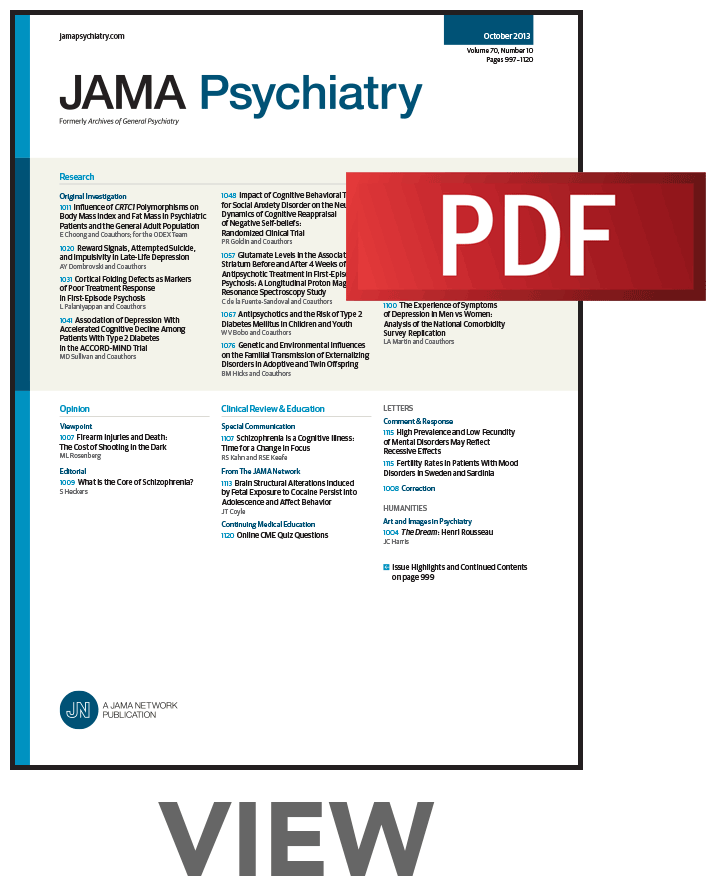Incidence and Nature of Antidepressant Discontinuation Symptoms: A Systematic Review and Meta-Analysis.
IF 17.1
1区 医学
Q1 PSYCHIATRY
引用次数: 0
Abstract
Importance The incidence and nature of discontinuation symptoms following antidepressant cessation remain unclear. Objective To examine the presence of discontinuation symptoms using standardized scales (eg, Discontinuation-Emergent Signs and Symptoms [DESS]) and the incidence of individual discontinuation symptoms in individuals who stop taking antidepressants. Data Sources The databases Embase, PsycINFO, Ovid MEDLINE, and Cochrane Library were systematically searched from inception until November 7, 2023. Study Selection Randomized clinical trials (RCTs) reporting discontinuation symptoms using a standardized scale or individual symptoms (eg, adverse events) following antidepressant cessation were included. Data Extraction and Synthesis Data extracted were cross-checked by 2 reviewers. Additional unpublished data from 11 RCTs were included. A random-effects meta-analysis was conducted to calculate standardized mean difference between individuals who discontinued an antidepressant vs those who continued an antidepressant or discontinued placebo. A proportion and odds ratio (OR) meta-analysis was performed to assess incidence of individual discontinuation symptoms compared to placebo. Subgroup analyses were conducted to compare different antidepressants. Data analysis was conducted between September 2024 and December 2024. Main Outcomes and Measures The primary outcomes were incidence and nature of antidepressant discontinuation symptoms measured using standardized or unstandardized scales. Results A total of 50 studies were included, 49 of which were included in meta-analyses. The 50 studies included 17 828 participants in total, with 66.9% female participants and mean participant age of 44 years. Follow-up was between 1 day and 52 weeks. The DESS meta-analysis indicated increased discontinuation symptoms at 1 week in participants stopping antidepressants (standardized mean difference, 0.31; 95% CI, 0.23-0.39; number of studies [k] = 11; n = 3915 participants) compared to those taking placebo or continuing antidepressants. The effect size was equivalent to 1 more symptom on the DESS. Discontinuation of antidepressants was associated with increased odds of dizziness (OR, 5.52; 95% CI, 3.81-8.01), nausea (OR, 3.16; 95% CI, 2.01-4.96), vertigo (OR, 6.40; 95% CI, 1.20-34.19), and nervousness (OR, 3.15; 95% CI, 1.29-7.64) compared to placebo discontinuation. Dizziness was the most prevalent discontinuation symptom (risk difference, 6.24%). Discontinuation was not associated with depression symptoms, despite being measured in people with major depressive disorder (k = 5). Conclusions and Relevance This systematic review and meta-analysis indicated that the mean number of discontinuation symptoms at week 1 after stopping antidepressants was below the threshold for clinically significant discontinuation syndrome. Mood worsening was not associated with discontinuation; therefore, later presentation of depression after discontinuation is indicative of depression relapse.抗抑郁药停药症状的发生率和性质:系统回顾和荟萃分析
抗抑郁药停药后停药症状的发生率和性质尚不清楚。目的采用标准化量表(如停药紧急体征和症状量表[DESS])调查停药患者停药症状的存在情况及停药个体停药症状的发生率。数据来源系统检索了Embase、PsycINFO、Ovid MEDLINE和Cochrane Library数据库,检索时间为2023年11月7日。研究选择纳入了使用标准化量表报告停药症状或停药后个体症状(如不良事件)的随机临床试验(rct)。数据提取与合成提取的数据由2位审稿人交叉核对。另外纳入了11项rct的未发表数据。进行了随机效应荟萃分析,以计算停用抗抑郁药的个体与继续使用抗抑郁药或停用安慰剂的个体之间的标准化平均差异。进行了比例和优势比(OR)荟萃分析,以评估与安慰剂相比个体停药症状的发生率。亚组分析比较不同抗抑郁药。数据分析时间为2024年9月至2024年12月。主要结局和测量主要结局是使用标准化或非标准化量表测量抗抑郁药停药症状的发生率和性质。结果共纳入50项研究,其中49项纳入meta分析。这50项研究共纳入17 828名参与者,其中女性占66.9%,平均年龄44岁。随访1天至52周。DESS荟萃分析显示,停用抗抑郁药的参与者在1周时停药症状增加(标准化平均差异,0.31;95% ci, 0.23-0.39;研究数[k] = 11;N = 3915名参与者)与服用安慰剂或持续服用抗抑郁药物的人相比。效应量相当于在DESS上增加1个症状。停用抗抑郁药与头晕的几率增加相关(OR, 5.52;95% CI, 3.81-8.01),恶心(OR, 3.16;95% CI, 2.01-4.96),眩晕(OR, 6.40;95% CI, 1.20-34.19)和紧张(OR, 3.15;95% CI, 1.29-7.64)。头晕是最常见的停药症状(风险差为6.24%)。停药与抑郁症状无关,尽管在重度抑郁症患者中进行了测量(k = 5)。结论和相关性:本系统综述和荟萃分析表明,停药后第1周停药症状的平均次数低于临床显著停药综合征的阈值。情绪恶化与停药无关;因此,停药后出现抑郁的时间较晚表明抑郁复发。
本文章由计算机程序翻译,如有差异,请以英文原文为准。
求助全文
约1分钟内获得全文
求助全文
来源期刊

JAMA Psychiatry
PSYCHIATRY-
CiteScore
30.60
自引率
1.90%
发文量
233
期刊介绍:
JAMA Psychiatry is a global, peer-reviewed journal catering to clinicians, scholars, and research scientists in psychiatry, mental health, behavioral science, and related fields. The Archives of Neurology & Psychiatry originated in 1919, splitting into two journals in 1959: Archives of Neurology and Archives of General Psychiatry. In 2013, these evolved into JAMA Neurology and JAMA Psychiatry, respectively. JAMA Psychiatry is affiliated with the JAMA Network, a group of peer-reviewed medical and specialty publications.
 求助内容:
求助内容: 应助结果提醒方式:
应助结果提醒方式:


